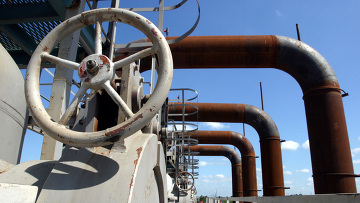
Turkmenistan Pressured by Gazprom’s Halt on Turkmen Gas Imports
Publication: Eurasia Daily Monitor Volume: 6 Issue: 125
By:

Russia’s suspension of gas deliveries via Ukraine to Europe last January was a hard lesson (not the first of this type) to consumer countries. Moscow’s prolonged and continuing stoppage of gas purchases from Turkmenistan (also not for the first time) is an even harder lesson to energy producing countries dependent on Russia’s import of their resources or Russian transportation of their resources to international markets.
Gazprom stopped the intake of Turkmen gas on April 9 when an ostensible "accident" damaged the main export pipeline. Although the line was supposed to be repaired within a week or two, Gazprom has not resumed imports of Turkmen gas since then (Interfax, June 26). Turkmenistan does not have alternative export outlets yet, although it is working hard to open such outlets. Moscow is leveraging its near-monopsony -while it lasts- to wring concessions from Turkmenistan in the bilateral gas trade.
Moscow’s export halt struck Europe amid seasonally-induced high demand. Moscow’s import stoppage, however, has struck Turkmenistan during the recession-induced low demand. Thus, Russia’s ongoing halt of gas imports from Turkmenistan has attracted far less international attention than its recent halt of gas exports to Europe. In normal economic times, Russian cessation of the gas flow from Turkmenistan (whatever the cause) for any length of time would have exerted strong ripple effects in Europe.
Turkmen gas is critical to Gazprom’s fulfilling its export commitments in Europe (or meeting the aggregate demand from Gazprom’s Russian and European customers) during cycles of economic growth or at least stability. Russia’s gas exports normally include large volumes originating in (or swapped with) Turkmenistan and delivered in Europe as Russian gas.
Traditionally, Gazprom takes at least 80 percent of Turkmenistan’s total annual gas exports at the Turkmen border (averaging some 45 billion cubic meters, out of some 50 to 55 bcm annually in recent years). Gazprom, the Kremlin, and their appointed intermediaries profit from the re-sale (or swap) of those volumes to Ukraine and European Union countries. The current recession, however, has reduced European demand for Russian gas and Russian-supplied Turkmen gas. The Kremlin has responded simply by stopping all purchases of Turkmen gas until further notice.
Gazprom acts as if it could do without Turkmen gas during the current recession and low demand. This situation coincides with the plunge of international gas prices through the delayed action of their peg to oil prices. Moscow is taking advantage of the current low-demand, low-price cycles to squeeze Turkmenistan into changing the terms of the agreements signed in March and December 2008.
Although the documents as such are secret, the delivery volume is reported at 40 or 45 bcm of Turkmen gas in 2009. Gazprom’s purchase price is known to have been set at $340 per one thousand cubic meters at the Turkmen border for the calendar year 2009. Gazprom is said to deduct approximately $20 from that price for transit fees. At that price, Gazprom can no longer profit from re-sales or swaps of Turkmen gas in Europe. Moreover, Gazprom’s intermediated schemes with Turkmen gas must incur losses since the higher purchase price has outrun the ultimate sale price (www.jamestown.org/blog, June 23).
Gazprom wants Ashgabat to reduce either the price or the volume of Turkmen gas delivered to Russia; or some combination of the two reductions. In either case, Turkmenistan’s national income (based almost entirely on gas exports) would be severely hit.
Russia’s prolonged stoppage puts Ashgabat under growing pressure to re-negotiate the existing agreements. High-level Russian delegations have been descending on Ashgabat almost on a weekly basis recently. During June, for example, Russian First Deputy Prime Minister and concurrently Gazprom Chairman Viktor Zubkov, Gazprom CEO Aleksei Miller, and the company’s vice-president and Gazexport Director-General Aleksandr Medvedev, held talks one after the other in Ashgabat with President Gurbanguly Berdimuhamedov and other Turkmen officials (Interfax, June 3, 14, 19, 21, 24).
Moscow apparently feels that it has the upper hand and can continue the import stoppage as long as necessary. On the occasion of Gazprom shareholders’ annual meeting, just held in Moscow, Medvedev simply recommended to "wait and see how the talks proceed" with Turkmenistan. More to the point, Miller indicated to the press that Ashgabat has no alternative option for export or swap operations until the Turkmenistan-China pipeline comes on stream (Interfax, June 26).
Ashgabat is intensifying its contacts with the European Union, European companies, and the United States in search of export diversification options for the future. Meanwhile, China provides the first alternative option at hand.




